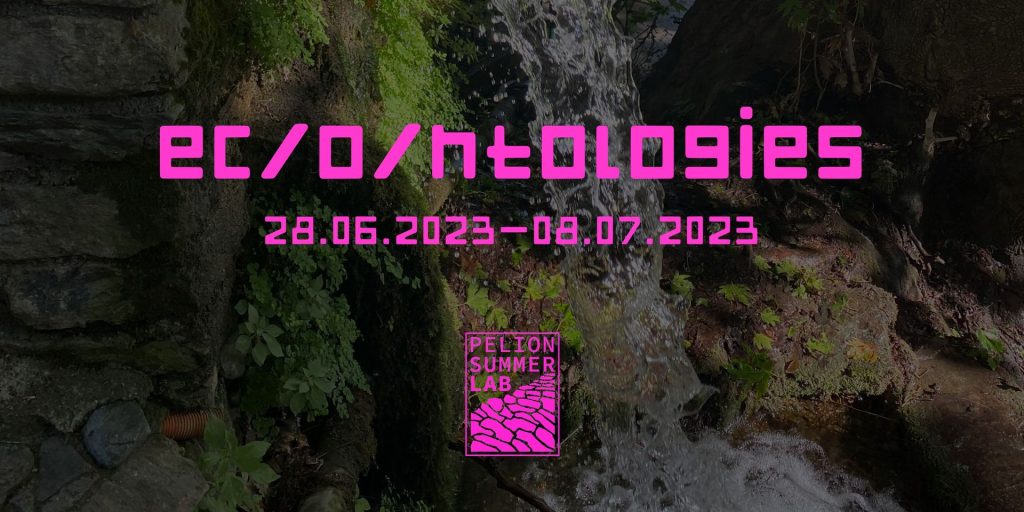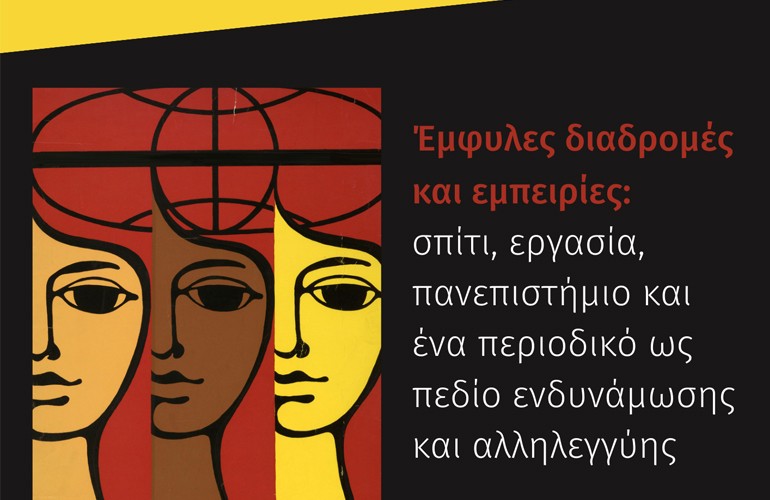The aim of ETHNOGRAPHEIN is to contribute to a critical and interdisciplinary debate on the theory and practice of ethnography, the epistemology of research, the importance of embodied experience, but also the ways of disseminating the produced anthropological knowledge to the academic and non-academic publics. The anthropological study, as research practice and as politics of writing, involves critical appraisal, empathy, reflection, and self-referentiality, and highlight the importance of the multimodal analysis of the local for understanding the general.
Organisation: Fotini Tsibiridou – Ioannis Manos – Eleni Sideri
The seminars are held on Mondays from 16:00-18:00
——————————————-
Seminar Platform: ZOOM Link https://zoom.us/j/8364531775?pwd=OVg3YVZlbmVCYWs3S0JYcEFGYlV1QT09
Meeting ID: 836 453 1775 Passcode: KB2JKa
In the year 2022-2023 in the Culture–Borders–Gender/Lab (https://cbg-lab.uom.gr/) the 3rd round of ETHNOGRAPHY took place from December to May, with the title:
“Public Anthropology, Femininities, Masculinities and Feminist Criticism”
From the standpoint of a critical Public Anthropology and its encounter with feminist criticism, the seminars focus on current fields of analysis in Gender Studies, such as the construction and performance of femininity and masculinity.
Embodying hegemonies, social inequalities and power relations in terms of palimpsest patriarchies, femininities and masculinities constitute the key stakes for identity politics. At the same time, masculinities, femininities and identity politics are a privileged lens for observing and investigating the challenges to the institutional policies of equality as well as the extreme reactionary tendencies towards them. In this cycle of seminars, the complexity and dynamics of the socio-cultural condition in the constitution of the subject and in the performance of the gendered self are sought, synchronously and diachrinically, both in inclusive and conflictual contexts.
Within different social and historical contexts of palimpsest hegemonies, epistemological hierarchy, economic inequality, abandonment in the peripheries and exclusions at the borders but also amid the generalization of conflicts and precarity, the importance of hegemonic and toxic masculinities that resort to violence explores the discrediting, possession and eventual expropriation of females, as the historically first, colonized bodies. Questions such as: How are hegemonic masculinities and toxic masculinities reproduced and multiplied? How do femininities react to the multiplicity of subordination and how do they respond to the challenge of emancipation? What is our attitude as researchers interpersonally, publicly and digitally in all this?
Themes Discussed:
– Femicides, geronticides, care.
– Women in street and Hip-Hop cultures.
– Masculinities and vendetta in the context of Crete.
-Patriarchy and colonialism of female and male bodies.
– Lesbian femininities and masculinities.
-New feminist methodologies.
-Eugenics, Heterosexuality and Family (1880s-1960s).
-Decolonization and gay identities.
-Feminist journals in the Greek academia.
-Feminist theories, aesthetic practices and global technologies.
Participants:
–Athena Peglidou, Assistant Professor at the Department of History & Archeology at A.U.Th.
–Natalia Koutsougera, social anthropologist (EDIP, Dept. of Social Anthropology, Panteio University).
–Angeliki Sakellariou, graduate of the Dept. of Communication, Media and Culture at Panteio University.
–Aris Tsantiropoulos, Associate Professor of Social Anthropology, Dept. of Sociology at the University of Crete.
–Anne Simati, Postdoctoral Researcher at the University of Macedonia.
–Fotini Tsibiridou, Professor of Social Anthropology at the University of Macedonia (Chairman of the Department of Balkan, Slavic and Oriental Studies, Director of the Culture-Borders-Gender/LAB, Chair of the Gender Equality Committee at PAMAK 2020-2023.
–Dimitra Tzanaki, Dr. of History (University of Oxford), Postdoctoral Researcher at PTDE, University of the Aegean.
–Irini Avramopoulou, Assistant Professor, Dept. of Social Anthropology, Panteio University.
–Athina Athanasiou, Professor at the Dept. of Social Anthropology, Dean of the Faculty of Social Sciences of Pantheon University, Director of the Anthropological Research Laboratory.
–Maria Liapi, Sociologist-Researcher, member of the Board of Directors. Committee, scientific manager of the Diotima Center.
–Elena Tzelepi, Assistant Professor of Philosophy at the University of Thessaly (Department of History, Archeology and Social Anthropology), President of the Equality and Anti-Discrimination Committee at the same university.
–Kostas Giannakopoulos, Professor at the Dept. of Social Anthropology and History of the University of the Aegean, President of the Gender Equality Committee.
–Iris Lykourioti, Associate Professor at the Dept. of Architecture of the University of Thessaly.
–Elpida Karamba, Associate Professor at the Dept. of Culture, Creative Media and Industries of the University of Thessaly, art theorist and exhibition curator.
–Christina Grammatikopoulou, Art Historian, Dr. of the University of Barcelona and postdoctoral researcher at the University of Macedonia.
On the YouTube channel of the workshop you will find the above seminars and all of the ETHNOGRAPHEIN series: https://www.youtube.com/@user-dh7bw3yl6t
Follow us on Facebook: https://www.facebook.com/groups/2431681233762012
Join the group: https://www.facebook.com/groups/2431681233762012
The Director of the Laboratory
Fotini Tsibiridou, Professor of Social Anthropology
Information:
Anna Moumtzoglou: anna@uom.edu.gr, 2310891778
Penelope Paka: pipaka@uom.edu.gr, 2310891176


